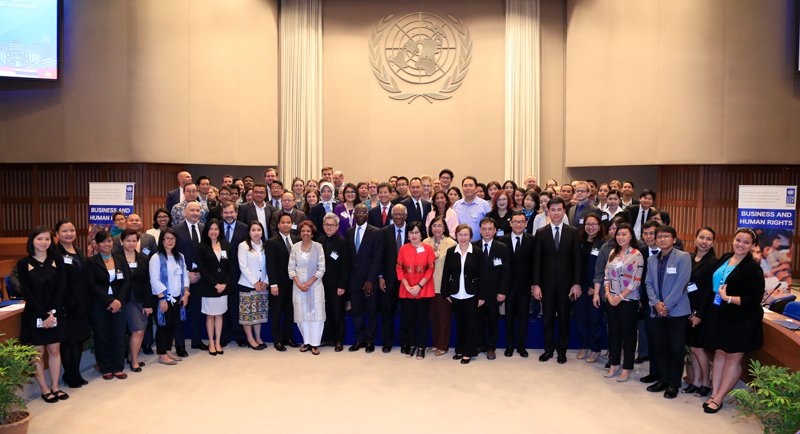Regional meet on Business and Human Rights in ASEAN opens in Bangkok

This regional workshop will contribute to embedding human rights in business activities in the ASEAN region, with a particular focus on the roles, duties and responsibilities of governments and business.
Representatives from the public, private and people sectors, from ASEAN member states gathered in Bangkok on Thursday in a workshop that will examine the region’s efforts in ensuring its international human rights commitments are reconciled with prevalent business practices.
The ASEAN region has undergone a remarkable economic and social transformation since it was founded in 1967.
ASEAN countries recorded, in the last ten years, an average level of growth higher than most developed countries and lagging only behind two other Asian nations, China and India.
However, this progress has, in some cases, been accompanied by negative repercussions for the human rights and has resulted in an enormous strain on the environment.
ASEAN, too, faces challenges such as corruption, land grabbing, forced labour, persecution of human rights defenders, discrimination against vulnerable groups including indigenous peoples and migrant workers, and environmental and health disasters such as the transboundary haze.
Five organisations (ASEAN Intergovernmental Commission on Human Rights (AICHR), Ministry of Justice of Thailand, UNDP, ASEAN CSR Network and UNESCAP) are co-organising the two-day conference titled “Regional Workshop on Business and Human Rights: Moving ahead with National Action Plans in ASEAN”.
This regional workshop will contribute to embedding human rights in business activities in the ASEAN region, with a particular focus on the roles, duties and responsibilities of governments and business.
A growing community of supporters of the UN Guiding Principles on Business and Human Rights in the region are gathering here to reaffirm the principle that economic growth, human rights and environmental protection are all mutually reinforcing drivers of sustainable well-being and prosperity.
“A business environment fully respectful of human rights attracts further long-term sustainable investments where risks are better managed. More investments create opportunities for economic growth which translates into more means for the States to help disadvantaged communities and fulfill their rights,” said Valerie Cliff, Deputy Regional Director for Asia and the Pacific, at UNDP’s Bangkok Regional Hub.
“We believe that responsible businesses means applying frameworks that protect, respect human rights and have access to remedies. This cannot be done alone. In ASEAN there is a regional commitment from multi-stakeholder groups to ensure that the environment is sustained and people have improved lifes.” said, Ms Yanti Triwadiantini, Chair, ASEAN CSR Network.
This workshop follows up on an ASEAN Intergovernmental Commission on Human Rights (AICHR) meeting held in November 2016 (Singapore), where an ASEAN Regional Strategy on CSR and Human Rights was discussed and presented. The proposed regional strategy calls for states, businesses, trade unions, civil society and other stakeholders in the region to work hand-in-hand to mainstream human rights practices in business operations.
It reinforces the objectives of the ASEAN “to realise a rules-based, people-oriented, people-centred ASEAN Community, where our peoples enjoy human rights and fundamental freedoms, higher quality of life and the benefits of community building, reinforcing our sense of togetherness and common identity, guided by the purposes and principles of the ASEAN Charter.” (ASEAN 2025: Forging Ahead together. Point 4 of the ASEAN Community Vision, page 13).
This regional workshop focuses on how decision-makers from all sectors, in particular governments and businesses, can implement this call and drive momentum for an ASEAN community that protects not just profits, but also people and the planet.
Sessions at the two-day conference will discuss the challenges and opportunities in developing National Action Plans on human rights, and dialogues with civil society organisations and trade unions.
One of the expected outcomes of this meeting is to take stock of how far ASEAN has progressed with regard to internationally-accepted business and human rights principles, as reflected by the UN Guiding Principles on Business and Human Rights (UNGPs) – the global standard for states and business enterprises on their respective obligations in relation to preventing and addressing business-related human rights impacts
This programme is made possible with support from Government of Sweden, Oxfam and Global Compact Network Thailand.
About ASEAN CSR Network (ACN)
As a leading regional network of CSR networks, ACN provides a platform for networking and cooperation at the ASEAN level, supports capacity – building and training activities, helps catalyse collective action on key issues, and provides a link with regional and international bodies interested in supporting the advancement of CSR in the region. For more information, please visit www.asean-csr-network.org
About UNDP
UNDP partners with people at all levels of society to help build nations that can withstand crisis, and drive and sustain the kind of growth that improves the quality of life for everyone. On the ground in nearly 170 countries and territories, we offer global perspective and local insight to help empower lives and build resilient nations. www.undp.org
Contact informationFor media enquiries, please contact:
Mahtab Haider
Communications Specialist
Bangkok Regional Hub, UNDP
Email: Mahtab.haider@undp.org
Bryan Khoo
ASEAN CSR Network
Email: bryan@asean-csr-network.org
Tel: +65 6813 9630
